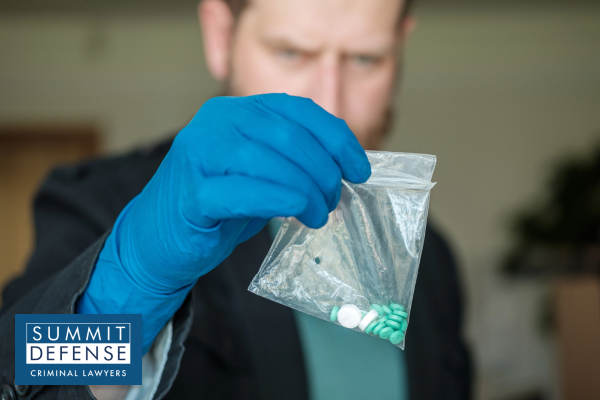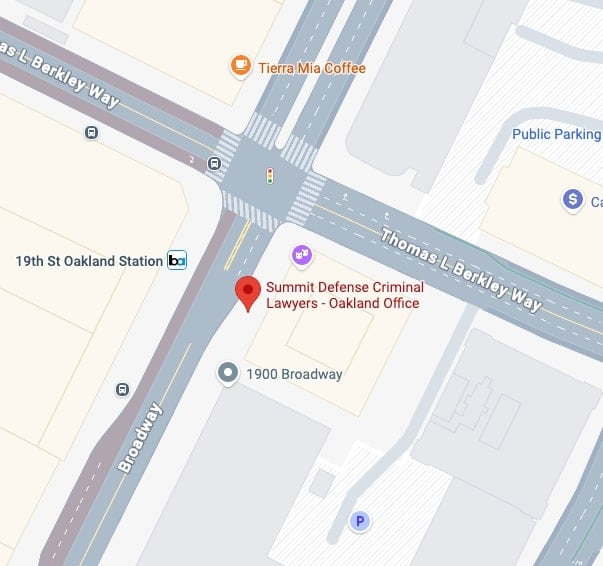Possession of Controlled Substances
Under California Health and Safety Code Section 11350, possessing an illegal substance without a valid prescription carries serious consequences. This includes cocaine base, heroin, methamphetamine, and unauthorized prescription medications. District attorneys must prove you knowingly possessed and controlled these substances.
Our Oakland criminal defense attorneys regularly help clients prove they didn't knowingly possess drugs found in shared spaces. A first offense typically results in up to one year in county jail, but we often secure alternative sentencing through drug treatment programs.
Possession With Intent to Distribute
California Health and Safety Code Section 11351 addresses possession with intent to sell. District attorneys examine factors like quantity, packaging, and financial records as evidence. With proper legal representation, we've helped many clients prove substances were for personal use rather than distribution.
The potential penalties are severe - you could face 2-4 years in state prison for a first offense. Cases involving large quantities or prior convictions face even harsher penalties. That's why choosing the right attorney matters for your defense.
Drug Trafficking and Manufacturing Charges
The law treats drug trafficking as a serious offense under California Health and Safety Code Section 11352. These cases often involve federal court jurisdiction, especially when crossing state lines. A conviction can bring 3-9 years in prison and substantial fines.
Manufacturing charges typically result from police raids. As your legal representation, we examine surveillance evidence and challenge informant credibility. Many criminal cases end with reduced charges when we expose weaknesses in the prosecution's evidence.
Possession of Drug Paraphernalia
California Health and Safety Code Section 11364 establishes penalties for possessing items used with illegal drugs. A misdemeanor charge for paraphernalia can bring up to 6 months in jail. Through effective legal representation, we often secure case dismissals through treatment programs.
Cultivation of Marijuana
Despite marijuana legalization, growing cannabis plants without proper licensing violate California Health and Safety Code Section 11358. You can grow up to 6 plants for personal use. Growing more plants or selling them without a license remains illegal.
A cultivation charge can result in 16 months to 3 years in jail. However, we often convince prosecutors to reduce the charges by showing that plants are for personal medical use under state law.
Sale or Transport of Marijuana
California Health and Safety Code Section 11360 still restricts marijuana sales and transport. Only licensed businesses can sell cannabis products. Moving large quantities across county lines without proper permits remains illegal.
Illegal transport charges can result in 2-4 years in prison. Our firm knows California's complex marijuana regulations. We help clients prove their activities fell within legal limits.
Schedule I-V Controlled Substances
The Drug Enforcement Administration classifies controlled substances into five schedules based on medical use and abuse potential. Schedule I drugs like heroin have no accepted medical use. Schedule V includes some prescription cough medicines with low abuse risk.
California drug laws reflect these classifications when setting penalties. Schedule I-II drug charges typically bring the harshest sentences. We help clients facing charges involving:
- Schedule I: Heroin, LSD, ecstasy
- Schedule II: Cocaine, methamphetamine, oxycodone
- Schedule III: Anabolic steroids, codeine products
- Schedule IV: Xanax, Valium, Ambien
- Schedule V: Medications with limited amounts of narcotics
Understanding drug schedules helps us build effective defenses and negotiate better plea deals when appropriate.
Marijuana Laws and Legal Exceptions in California
California's marijuana laws changed dramatically after legalization. Adults 21 and older can possess up to one ounce of cannabis or 8 grams of concentrate for personal use. Medical marijuana patients can possess larger amounts with proper documentation.
The state allows adults to grow up to 6 plants at home. However, local laws might restrict indoor or outdoor cultivation. Selling marijuana requires state and local business licenses plus strict compliance with regulations.
While personal use is legal, you can still face charges for:
- Possessing more than the legal limit.
- Selling without proper licenses.
- Driving under the influence.
- Bringing marijuana across state lines.
Consequences of a Drug Conviction

A drug conviction affects far more than your immediate freedom. The effects can follow you for years, touching every aspect of your life, from jobs to housing to education.
Fines and Jail Time for Various Charges
Drug crime penalties in California vary depending on the offense type and your record. Simple possession might result in 6 months to 1 year in county jail plus fines up to $1,000. Sales charges can result in 2-4 years in prison and $20,000 in fines.
Multiple convictions or large quantities lead to sentence enhancements. A prior drug sales conviction can add 3 years to your sentence. We fight to keep our clients out of jail through treatment programs and alternative sentencing.
Impact on Employment and Future Opportunities
A conviction under criminal law can create lasting barriers. Schedule IV drugs and other controlled substance charges often trigger professional licensing issues. Many clients don't realize how marijuana crimes can affect their future opportunities.
Immigration consequences pose additional risks for non-citizens. A drug conviction might lead to deportation or denial of citizenship. We evaluate every aspect of offenses related to drugs to protect your immigration status.
Mandatory Drug Treatment Programs
California offers several treatment alternatives to jail time. Programs like Drug Court and Proposition 36 allow eligible defendants to receive treatment instead of incarceration, and completing treatment can lead to dismissed charges.
Our attorneys help clients enter these programs when appropriate. We've seen how treatment addresses underlying substance issues while avoiding the lifelong consequences of a conviction.
Defenses Against Drug Crime Charges
Our Oakland defense attorneys build strong legal strategies based on the facts of your case. We examine police conduct, search procedures, and evidence handling to identify constitutional violations and procedural errors.
Illegal Search and Seizure
The Fourth Amendment protects you from unreasonable police searches. Officers need a valid warrant or probable cause to search you, your car, or your home. However, we often find police conducting illegal searches during traffic stops or home visits.
Our attorneys file motions to suppress evidence from illegal searches. We look for cases where police:
- Searched without consent or a warrant.
- Exceeded the scope of your consent.
- Used expired or invalid warrants.
- Lacked probable cause for the search.
When courts throw out illegally obtained evidence, prosecutors often drop the charges.
Entrapment and Police Misconduct
Police cross legal lines when they pressure people into committing crimes. Entrapment occurs when officers induce you to commit an offense you wouldn't normally consider. We examine police conduct to identify improper tactics.
Common forms of misconduct include:
- Planting drugs during searches.
- Falsifying evidence reports.
- Coercing confessions.
- Making promises to get statements.
- Using excessive force.
We've exposed misconduct through body camera footage, witness statements, and inconsistent police reports.
Lack of Possession or Knowledge
Prosecutors must prove you knowingly possessed illegal drugs. This gets complicated when drugs are found in shared spaces like:
- Apartments with multiple residents.
- Cars with several passengers.
- Workplaces are accessible to others.
- Borrowed clothing or bags.
We help clients show they didn't know about drugs found in these situations. Many cases end in dismissal when prosecutors can't prove knowledge and control over the substances.
How an Oakland Drug Crimes Lawyer Can Defend Your Rights

Facing drug charges alone puts you at a serious disadvantage. The prosecution has vast resources and experience. You need a skilled defense team to level the playing field and protect your rights.
At Summit Defense, we bring decades of experience fighting drug charges in Oakland courts. We know local prosecutors, judges, and court procedures. This insight helps us anticipate prosecution strategies and build stronger defenses.
Our attorneys start working immediately after you contact us. We:
- Review police reports and evidence.
- Interview witnesses.
- File motions to preserve evidence.
- Challenge illegal searches.
- Negotiate with prosecutors.
- Prepare cases for trial.
We explore every defense option, from challenging evidence to proving legal marijuana possession. Our goal is to secure the best possible outcome: dismissal, acquittal, or reduced charges with minimal penalties.
Time is critical in drug cases. Early intervention allows us to preserve evidence and protect your rights from the start. By working with prosecutors early, we often resolve cases before charges are filed.






 Don't face drug charges alone. At
Don't face drug charges alone. At 









